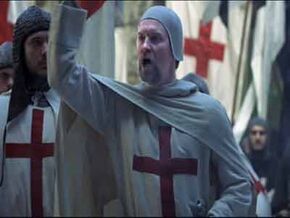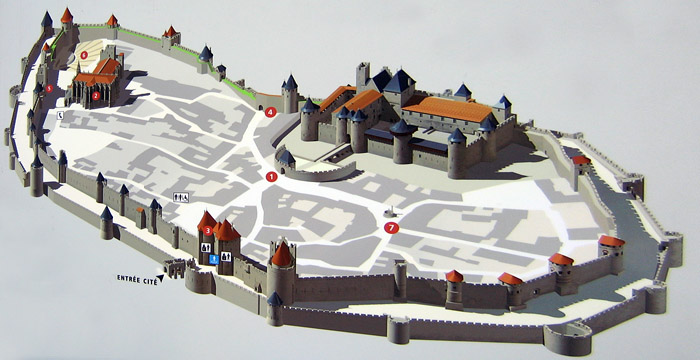God will know those who are His
"Nevertheless the foundation of God stand sure, having this seal, The Lord know them that are His." The Second Epistle of Paul to Timothy
The baron’s crusade
In the spring of 1210 [1], a Crusade host numbering more than 25.000 man (don’t only 15.000 were combatants) finally gather in Lyon. People from different coins of Europe, but mostly from France, responded to the Pope’s call to “
fight for the Crucified One alongside the Garonne as they done on Jordan”. According to Tudela they were: “
Alaman e Bavier e Saine e Frison, Mancel e Angevi e Norman e Breton, Logombart e Lombart, Proensal e Gascon”.
As the King Philip had other pressing issues to solve with and could not respond to the Pope’s call, he accept however that his vassals to participate to it, if they wished. In his narrative accounts of the crusade, the Cistercian Peter of Les Vaux-de-Cernay said that “
Philip, called Augustus, King of the Franks, (Philippus qui dicitur Augustus, Francorum Rex) could not fight against the Provincial heretics (Provincialis heretici) as two dangerous lions were poised to tear him limb for limb”[2].
Of course, his refuse had also another dimension – a juridical one: a decision to confiscate the fiefs to a lord belongs only to his overlord, in this case the King and for good reasons, and not the Pope who should had power only over the clergy. If he will join, then he will acknowledge the power of the Pope being greater than him.
Attracted by religious fervor, the absolution of the sins, the promises of booty and the promise that they could keep the lands they conquer, many French knights and barons join the Crusade. The Duke of Burgundy, bellicose as always, gladly join it as well as his great rival, Hervé IV of Donzy, count of Nevers. Other important members of the crusade were Hugh de Lacy, Earl of Ulster, Erard of Brienne [3], lord of Ramerupt and Venizy, William of Roches, seneschal of Anjou, Amaury de Craon, Gaucher of Châtillon, count of Saint-Pol, Robert of Alençon, Etienne II of Sancerre, brother of the count William of Sancerre and lord of several baronies, the famous crusader Simon of Monfort-Aumory, lord of Montfort and deposed earl of Leicester, the Bishop Jordan of Lisieux, the count Thomas of Maurienne from Savoy, Adhémar de Poitiers, count of Valentinois and Diois, Waleran lord of Monjoie, viscount Roard de Donges, Gaucher I de Joigny, lord of Châteaurenard, Juhel de Mayenne, William II of Geneve, Humbert of Geneve, Guy I of Lévis and many other barons of less importance [4].
As Burgundy brought the greatest number of troops and being the greatest lord, he expected to lead the crusaders but this was staunchly opposed by Herve of Donzy, Etienne of Sancerre and Thomas of Maurienne. The impasse was solved by offering the command to the papal legate, Arnaud Amaury, abbot of Cîteaux, a man with little military expertise.
Ulrich Thomsen as Arnaud Amaury in the movie “The Pope’s many Enemies”
The army descend slowly on the Rhone valley, while the disappointed Duke look for reasons to returns to his fiefs. Entering in the lands of Raimond of Toulouse, the Crusaders had the surprise (unpleasant one for many who were now deprived of booty) to see the proud count asking for pardon. Amaury was now in difficulty, but a sinner who repent should be received in the House of God so he award the pardon but only after his total submission, the engagement to fight against the heresy on his lands and the promise to join the crusade. In impossibility to attack the lands of Toulouse, the crusaders had only two left choices: attack the ones held by the King of Aragon or the one of held by the House of Trancavel. Hoping to gain time, Raimond-Roger Trencavel decide to negotiate with the crusaders. Wrong move, as they do not come for that.
Beziers
In 15 May 1210, the host arrived in Beziers and, Arnaud request to the local Bishop, Renaud de Montpeyroux, to handover all the known heretics. The Bishop make a list of 223 persons known as heretics but the assembly of the habitants refuse to complain. Then, the crusaders send an envoy to the citizens asking that all good Catholics to leave the city otherwise they will be considered accomplices. Feeling safe behind the walls and knowing that the viscount will come in their help, only the Bishop and a handful people leaves [5]. One hour later, the crusaders give the assault. But the city stood as the garrison was reinforced and many citizens join the defence, so it was put under siege [6]. While the siege drag in, the crusaders founded itself quickly in a bad position as in absence of the booty, many of their troops seems to be eager to leave after the 40 days service and the actual leadership could not convince them otherwise. Even worse, Trancavel gather his forces in Carcassone, while Peter of Aragon was crossing the Pyrenees with an army and nobody knew about his intentions.
Working against the clock, the crusaders launch several assaults, bleeding against the fortifications that seems to be impenetrable. They bombarded the walls day and night. Well after the midnight of 12 June, a trebuchet projectile finally create a breech in the walls and the hell was unleashed. The assailants quickly wake up and mount a new attack, penetrating the walls and seizing a gate. More and more soldiers entered in the city and an orgy of slaughtering, rapes, pillage and fire begin and do not stopped for nearly one day and one night.
The legend said that Arnaud Amaury personally ordered to have everybody put to death, heretics and good Catholics with the infamous words: “
Kill them all. For God will know those who are His”. But it’s just a legend, as Amaury had no real control of his troops and he was even not present on the spot when the breach was made and the attack started.
As per his own words in a letter to the Pope, the legate confess that he was not aware of the massacre till to late and he had no power to stop it:
“Being so late in the night, crying "to arms, to arms!" wake everybody and to our amazement, within the space of two or three hours, our men crossed the ditches and then, the broken wall of Béziers was taken. They spared no one, irrespective of rank, sex or age, and put to the sword almost 20.000[7] people. After this great slaughter the whole city was despoiled and burnt”[8].
The “massacre of Beziers”, how it will be known, was a spontaneous act and it seems to have being just in the eyes of the attackers as the habitants of the city had choose to protect the heretics and so they had choose to be solidary with them.
The immediate effect of the ferocious sack of the city was spreading fear and terror in the hearth of men from every city and town in the region. The barons decided to grant the conquered lands to a leader of the crusaders in order to make the conquest permanent. Raymond of Toulouse offered itself but it was refused. They elected Simon of Montfort but he turned down [9] so they choose Gaucher of Châtillon who also turned down and then they finally choose
Hervé of Donzy to “
guard the faith and defend these lands”. For this mission, he will be “granted with the revenues and harvest of these lands with all other justice and jurisdictions” as he “
cannot carry on military campaign from his own founds nor should he be expected to do so” [10]. After long hesitations he finally agree[11]. The only opponent to this election was the Duke of Burgundy who accepted only after he received back the Liernais who he had ceded to Donzy before leaving to crusade.
Carcassonne
Model of the City of Carcassone in XIII century as it is found in the Museum of the city of Carcassone
The army move next to Carcassonne, the other stronghold of Trancavels and another important center of heresy. While the sack of Beziers put fear in the heart of the common people, the one of Carcassonne put fear in the heart of the Occitan noblemen.
After surrounding the town and a successful attack that captured the suburbs and the main water access, the crusaders lead several unsuccessful assaults of the walls. The assaults, supported by the chants of “
Veni Sancte Spiritus” were concentrated to the northern part as the part of the walls that border the burg was less fortified than others [12]. The viscount Raymond-Roger counterattack and captured many of the assailants. Then the besieged used a couillard [13] to throw out from the city the limbs and heads of those captured. The crusaders than demolish all the buildings of the burg and move siege engines to that part for breaching the walls. As reprisal, the viscount lead a sortie to destroy the siege workings but it finish in a disaster as many Occitan knights were captured. Without enough water, Raymond-Roger tried to negotiates but he was captured and hanged, while the captured knights were blinded in front of the walls. The message is clear: “You do not argue with the Pope's army! You obey, or you perish”[14].
“Never so far as I know has so great a lord been hanged in all Christendom, nor with so many knights tortured at his side.” William of Tudela.
The citizens received the ultimatum: you resist and you will be put to the sword or you surrender and be spared. Wisely, and without leader, they choose the second option. The habitants were allowed to leave the city with only their cloths on them, nothing more. After that, the empty town was carefully sacked. The crusaders were in hurry as most wanted to return and the King of Aragon was not far away with several thousand man.
Right after, all the cities and most of the castles on the lands of Trancavel capitulates. While Hervé of Donzy stylish itself as viscount of Albi, Beziers and Carcassonne and receive from the Pope the title of “The most Christian Athlete of the Faith”, the majority of the crusaders turned back to their lands with all the plunder, leaving the new viscount with less than 100 knights and a couple of thousands foot to rule a very hostile population.
The Cathar Slayer and the Millice of Christ
“If by kindling evil and quenching good, by killing women and slaughtering children, a man can in this world win Jesus Christ, certainly he [15] wears a crown and shines in heaven above”. "Song of the Albigensian Crusade” by William of Tudela
Marton Csokas as Hervé of Donzy in the movie “The Pope’s many Enemies”
Unfortunately for Hervé, to rule of the new conquered lands will not be an easy task. During the winter, most of the towns and fortress under Hervé control rebelled and reject or kill their garrisons.
Peter of Les Vaux-de-Cernay tell the story which
"cannot be heard without tears” of the captured crusaders who
"had their eyes put out, their tongues removed, were dragged behind horses, stoned, dropped from the ramparts, or drowned with mill-stones around their necks”. One of the victims was no other than his only son, Guillaume of Donzy…
Herve start to conduct a methodical conquest of castle by castle. In order to enforce his rule, he rely on the newly created “Millice of Christ” to fight against heresy. It was a fanatical force made by fervent Catholics and pilgrims of different backgrounds and origins who patrolled the country and brought to trial all unrepentant heretics. A trial by fire.
The war against the Cathars and the southern nobles will continue and it will see several waves of northern knights who took the cross and campaign in the south for 40 days, returning to their home with heavy plunder and consciences.
---------------------------------
Main Sources:
Source of the photos :
Carcassonne :
http://www.ceillac.com/ecole-peniche/cv-peniche-j6.html
Characters :
Raimond-Roger:
http://www.a-nossa-penseira.com/2012/03/trailer-de-labyrinth-estrelado-por-tom.html
Others:
http://villains.wikia.com/wiki/
Other sources:
Wikipedia
"A Most Holy War : The Albigensian Crusade and the Battle for Christendom" By Mark Gregory Pegg
"The Albigensian Crusades: Wars Like Any Other?" by By Malcolm Barber
"Who Went on the Albigensian Crusade?" by Daniel Power
"Cathars and Cathar Beliefs in the Languedoc"
http://www.cathar.info/cathar_wars.htm
http://www.ceillac.com/ecole-peniche/cv-peniche-j6.html
http://bbcp.pagesperso-orange.fr/english/cite/histoire/hist.html
http://www.histoireeurope.fr/
--------------
[1] One year later than OTL
[2] Adapted from "A Most Holy War : The Albigensian Crusade and the Battle for Christendom" By Mark Gregory Pegg
[3] Not present IOTL but he join as it was busy with Champagne succession issue but he join TTL the Crusade as he do not want to mess with the king who had the tutorship of young count Theobald.
][4] Source:
http://www.cathar.info/cathar_wars.htm
][5] Happened as per OTL
[6] In OTL the siege was quickly won by exploiting a failed sortie of the besieged garrison
[7] The modern estimates cut the number to approx. 7000 people.
[8] Adaptation of OTL words
[9] He refused it IOTL but he had been convinced to accept by his friend Pierre of Vaux de Cernay
[10] Adapted from "A Most Holy War : The Albigensian Crusade and the Battle for Christendom" By Mark Gregory Pegg
[11] In OTL he refused the titles. ITTL he accept
[12] TTL siege of Carcassonne was inspired from OTL one described in "A Most Holy War : The Albigensian Crusade and the Battle for Christendom" By Mark Gregory Pegg
][13] A small trebuchet
[14]
http://www.histoireeurope.fr/
[15] The OTL text was referring to the count Simon of Montfort, ITTL he refers to Herve of Donzy



